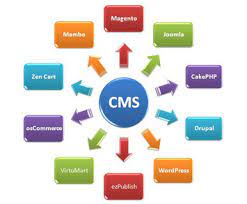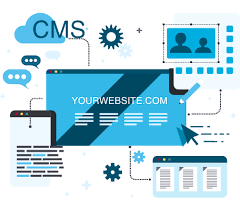In today’s digital age, having a strong online presence is crucial for businesses to succeed. Content Management Systems (CMS) have revolutionized the way websites are developed and managed. A CMS website allows users to create, edit, and publish content without the need for extensive technical knowledge.
CMS website development has become increasingly popular due to its user-friendly interface and flexibility. With a CMS, businesses can easily update their websites with new content, images, and videos without the need for coding skills. This not only saves time but also allows for quick and efficient updates to keep the website fresh and engaging.
One of the key benefits of CMS website development is its scalability. As businesses grow and evolve, their websites need to adapt to meet changing needs. With a CMS, it is easy to add new pages, features, and functionality without having to start from scratch. This makes CMS websites a cost-effective solution for businesses of all sizes.
Another advantage of CMS website development is its SEO-friendliness. Search engine optimization (SEO) is crucial for driving traffic to a website and improving its visibility online. CMS platforms offer built-in SEO tools that make it easy to optimize content for search engines, helping businesses rank higher in search results.
Overall, CMS website development offers businesses a convenient and efficient way to create and manage their online presence. With its user-friendly interface, scalability, and SEO benefits, a CMS website is an essential tool for any business looking to succeed in the digital world.
Top 7 Frequently Asked Questions About CMS Website Development
- What does the CMS website do?
- What is CMS and website builder?
- What is CMS development website?
- What is CMS website development?
- Do you need a CMS to build a website?
- What is a CMS website examples?
- What is CMS platform for website?
What does the CMS website do?
A Content Management System (CMS) website serves as a powerful tool that allows users to create, manage, and publish digital content without the need for technical expertise. With a CMS website, users can easily update text, images, videos, and other multimedia elements on their website through a user-friendly interface. This flexibility enables businesses to keep their websites current and engaging, ultimately enhancing their online presence and user experience. Additionally, CMS websites offer scalability, SEO-friendliness, and cost-effectiveness, making them an essential solution for businesses looking to establish and maintain a dynamic online presence.
What is CMS and website builder?
A common question that arises in discussions about CMS website development is the distinction between a CMS and a website builder. A Content Management System (CMS) is a software application that allows users to create, manage, and modify digital content on a website without the need for coding skills. On the other hand, a website builder is a tool that enables users to design and build websites using pre-designed templates and drag-and-drop functionality. While both CMS and website builders serve the purpose of simplifying website development, they differ in terms of flexibility and customization options. A CMS offers more control over content creation and management, making it suitable for businesses with specific requirements, while a website builder is often more user-friendly for individuals or small businesses looking to quickly create a basic website. Understanding the differences between CMS and website builders can help individuals and businesses choose the right platform based on their needs and technical expertise.
What is CMS development website?
A CMS development website refers to a website that is built using a Content Management System (CMS). A CMS is a software application that allows users to create, edit, and manage digital content without the need for extensive technical knowledge. With a CMS development website, users can easily update content, images, and other elements of their site through a user-friendly interface. This makes it simple for businesses to maintain and customize their websites without the need for coding skills. Overall, CMS development websites offer a convenient and efficient way to create and manage online content, making them an essential tool for businesses looking to establish a strong online presence.
What is CMS website development?
CMS website development refers to the process of creating a website using a Content Management System (CMS). A CMS is a software platform that allows users to easily manage and update website content without the need for advanced technical skills. With CMS website development, businesses can efficiently create, edit, and publish content such as text, images, and videos on their websites. This user-friendly approach streamlines the website management process and empowers businesses to maintain an up-to-date and engaging online presence. Overall, CMS website development simplifies the task of building and maintaining a professional website, making it an essential tool for businesses seeking to establish a strong online presence.
Do you need a CMS to build a website?
The question of whether a CMS is necessary to build a website is a common one in the realm of website development. While it is possible to create a website without using a CMS, opting for a CMS can offer significant advantages. A CMS simplifies the process of managing and updating website content, making it easier for users with varying levels of technical expertise to make changes without relying on coding knowledge. Additionally, a CMS provides scalability and flexibility, allowing for easy expansion and customization as the website grows and evolves. Ultimately, while not essential, utilizing a CMS can streamline the website development process and enhance overall functionality and user experience.
What is a CMS website examples?
A Content Management System (CMS) website is a platform that allows users to create, manage, and update digital content without the need for extensive technical knowledge. Examples of popular CMS websites include WordPress, Joomla, Drupal, and Wix. These platforms offer a user-friendly interface that simplifies the process of website development and content management. With a CMS website, users can easily customize their site’s design, add new pages and features, and update content on a regular basis. The flexibility and scalability of CMS websites make them an ideal choice for businesses looking to establish a strong online presence efficiently.
What is CMS platform for website?
A CMS platform for website development refers to a Content Management System that allows users to create, manage, and publish digital content on their websites without the need for extensive technical expertise. Essentially, a CMS platform serves as a user-friendly interface that simplifies the process of website management by providing tools for content creation, editing, and organization. This platform enables users to update their websites with new information, images, and multimedia elements easily and efficiently. By utilizing a CMS platform, businesses can maintain a dynamic online presence and engage with their audience effectively.




